Understanding the Dobbs decision
THIS ISSUE:
Legal Implications of COVID Protocols/Vaccines/Testing
Judicial Review Prevails Over Judicial Activism in Dobbs

Dissenting Against Dobbs: The Downgrading of Women’s Rights and Safety
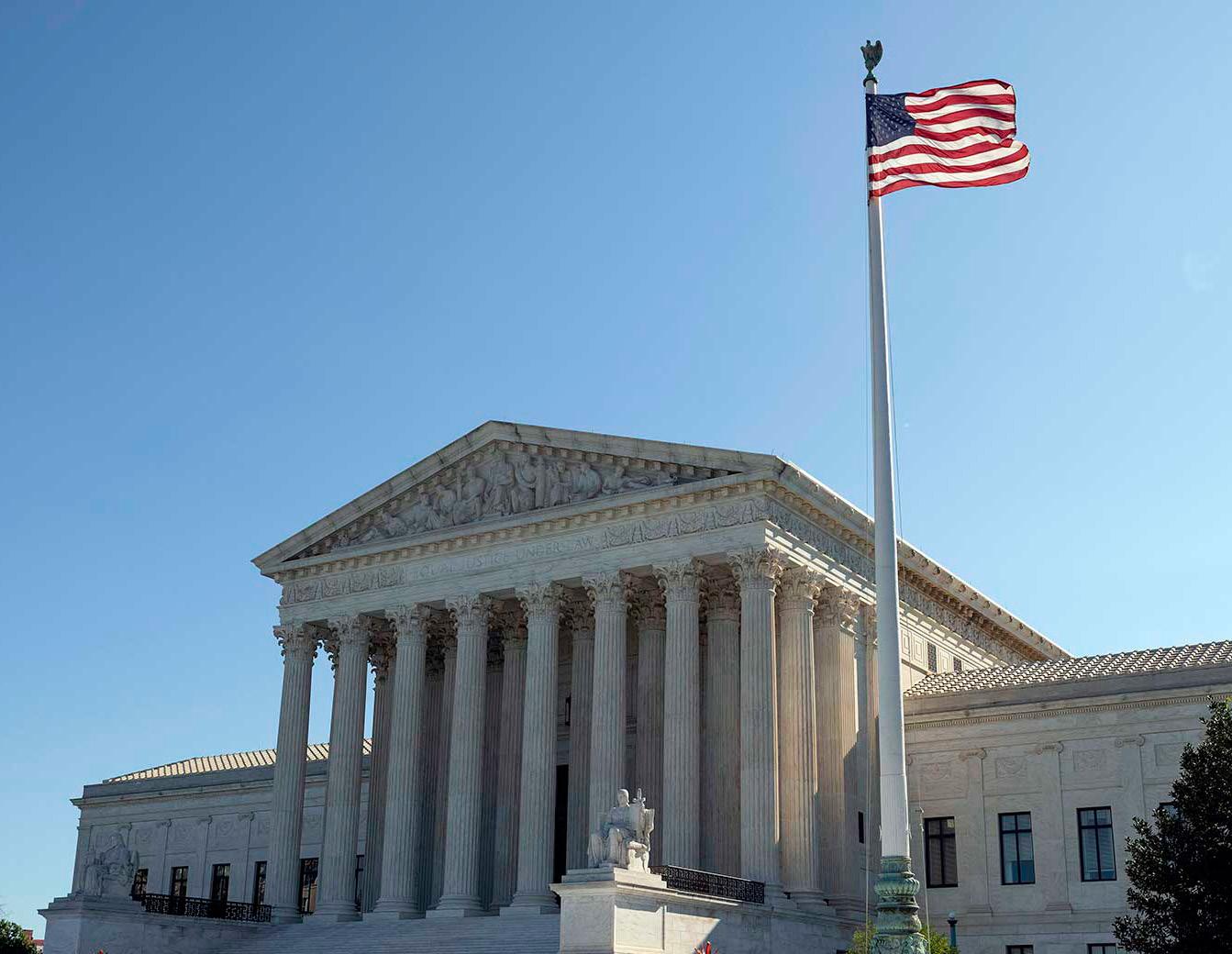
the magazine of the Memphis Bar Association | Vol. 39, Issue 3, Fall 2022

SEND YOUR PERSONAL INJURY CLIENTS TO THIS HOUSE We’ll send you up to 1/3 rd of the fees The Home of Personal Injury Law Contact Sadler Bailey or Thomas Greer at 901-680-9777 or tgreer@baileygreer.com today. 6256 Poplar Avenue | Memphis, TN 38119 | www.baileygreer.com 6256 Poplar Avenue has long been the home of personal injury law in the Mid-South. And we want it to be a second home for your clients. Give us a call today and let’s talk referral fees. Take care of your clients. Grow your business. *The sharing of attorney fees must comply with Tenn. R.P.C. 1.5
6 Judicial Review Prevails Over Judicial Activism in Dobbs
 BY LYNDA WRAY BLACK
BY LYNDA WRAY BLACK
10 Dissenting Against Dobbs: The Downgrading of Women’s Rights and Safety
MAUREEN HOLLAND
BY DARRELL O’NEAL AND ADRIANE O’NEAL
JENNIFER SINK
BY STEPHEN LEFFLER
KERRY KRAUCH

Volume 39, Issue 3, Fall 2022
FEATURES
BY
16 Legal Implications of COVID Protocols/Vaccines/Testing
COLUMNS
21 Court Report: Shelby County
Court
5 President’s Column BY
Circuit
24 Court Report: United States District Court
26 CLC Corner: Big Things Happening at the CLC BY
28 MALS: Addressing the Justice Gap BY CINDY COLE ETTINGOFF 30 2022 MBA Annual Meeting 32 Bar Scene 37 People in the News
BY AUDREY CALKINS
MEMPHIS LAWYER

the magazine of the Memphis Bar Association
Memphis Bar Association Publications Committee


Nicole M. Grida, Chair



Audrey Calkins
Maureen Holland
Marlinee Iverson
Steve Leffler
Halle Priester
The Memphis Lawyer is a quarterly publication of the Memphis Bar Association, Inc. with a circulation of 2,000. If you are interested in submitting an article for publication or advertising in an upcoming issue, contact info@memphisbar.org. The MBA reserves the right to reject any advertisement or article submitted for publication.
MBA STAFF
The Memphis Bar Association 145 Court Ave. Suite 301 Memphis, TN 38103 Phone: (901) 527-3573
www.memphisbar.org
Mary Ann Upchurch Executive Director
Lauren Gooch Membership & CLE Director
Kelly Swan Communications Director
By JENNIFER SINK, MBA 2023 President


Bzzzzz? Do you hear that? It is the sound of excitement still ringing from our annual meeting in December 2022 at the Botanic Gardens!
The Annual Meeting was a wonderful event. I can still hear the sounds of people who left the meeting feeling energized and inspired for 2023! This was our first Annual Meeting held in the evening since 2019; and it felt so good to see so many people gathered, connecting and catching up.
For those who were unable to join us, we touched on so many different ways the MBA is given meaning and import. We honored civility, professionalism, mentoring, commitment, leadership, and skill. We welcomed new Board members with open arms. There were laughs, there were tears. There were reflections on what it means to be a lawyer and a member of the Memphis Bar Association.
Past President Tannera Gibson showed tremendous leadership in 2022, as we were navigating the challenges presented by Covid and changes in our work environment, along with serious issues that impacted our members personally and professionally, such as racial injustices, and legal and political attacks on our constitutional rights.
While these challenges remain, there is much to be encouraged over. And we are prepared to continue to face these challenges head on.
It starts with YOU! If you missed out on the events the MBA held in 2022, from our amazing Bench Bar Conference to ground-breaking CLEs, you might need to tap into your inner FOMO for 2023. We have lots of great events planned. Here is a sneak peek:
• CLE with the Grizzlies
• Anniversary of the release of the epic film, “The Firm”
• Black History Month CLE

• Bench Bar 2023 returns to The Grand Hotel Golf Resort & Spa
• Second Saturday Free Legal Aid Clinic (2SLAC) is back in person!
• John Dice Wellness Seminar makes its return to Lichterman Nature Center!
• Leadership Scholars Program provides a great chance to mentor law students, the future lawyers of our profession.
• Summer Law Intern Program (SLIP) gives diverse high school students the opportunity to experience the daily legal workplace

I believe people are ready to see and be seen again. If you are someone who took a break from the MBA, please rejoin us! We need you more than ever to serve, to share, to give, and to learn.
We are going to have a great year at the MBA. Thank you all for the honor and opportunity to serve as your Bar President.

5
COLUMN PRESIDENT'S 24 hour access with private entry codes Shared conference and meeting rooms High speed internet included Lease rates range from $450-$900 Walking distance to many restaurants & vendors OFFICE SPACE FOR LEASE candyfactorysuites.com candyfactory25@gmail.com 901-322-8018 FIRST MONTH FREE terms & conditions apply DOWNTOWN MEMPHIS 25 Dr MLKing Jr Ave. Memphis, TN 38103 SCAN ME
Judicial Review Prevails Over Judicial Activism in Dobbs
 By LYNDA WRAY BLACK
By LYNDA WRAY BLACK
As Justice Alito’s majority opinion correctly begins, “[a]bortion presents a profound moral issue on which Americans hold sharply conflicting views.” Acknowledging that truism (and further acknowledging that the initial sentence may be the only sentence of the majority opinion with which some of you concur), let me begin by stating that I have not been asked to share my moral views on abortion. It is the legal correctness of Dobbs v. Jackson Women’s Health Organization (hereinafter Dobbs) for which I advocate. Unlike many readers of this article, I have read the Dobbs opinion — all 213 pages inclusive of footnotes, appendices, two concurring opinions, one concurrence in the judgment, and one dissent. And, like many of you, I have heard months’ worth of commentary, one might say vitriol, on the majority opinion presenting the holding and reasoning of five members of our highest court, with one additional Justice concurring in the judgment.
Through this article I hope to clarify what Dobbs does (and does not) say. I will provide the Constitutional framework which supports the correctness of the majority. Finally, I will address several tangential issues which, though not governed directly by the holding of the case, are supremely important issues facing our country.
What does Dobbs hold? Justice Alito penned the opinion of the Court which holds the United States Constitution does not confer a right to abortion. Consequently, Dobbs overturns Roe v. Wade which had first created the Constitutional right to abortion in 1973 by the “exercise of raw judicial power” (quoting from Justice Byron White’s dissent in Roe). Interestingly, critics of Dobbs sling accusations of judicial activism against the conservative Justices composing the majority. It appears that one’s tolerance for judicial activism is directly proportionate to one’s agreement with the result obtained by the activism.
One might conclude, as many in the media have, that the overturning of Roe is synonymous with the eradication of the right to an abortion. That is where
logic fails. The American people possess many rights. Some rights are Constitutional rights; many others are conferred by and regulated by the States. Abortion and other reproductive rights (which I will touch on at the end of this article) have been returned to the people and to their elected state representatives. The right to an abortion has not ended categorically. It has been properly returned to the states for determination. The misunderstanding of this simple fact has created a false narrative as seen in the words of President Biden, who when speaking to the media the day the Dobbs opinion was released, stated the Supreme Court “simply took it away” referring to a woman’s right to seek an abortion. That is simply a false political narrative.
You might question why I stated above that the regulation of abortion has been properly returned to the states. Unpacking this issue requires precise Constitutional analysis unmarred by an end run to the desired result on the particular facts presented. To follow the analysis, we must first understand the genesis of the Constitutional right of abortion. In 1973, a pregnant
6
single woman challenged the constitutionality of the Texas statutes (first enacted in 1854) which criminalized abortion except for the purpose of saving the mother’s life. In the opinion delivered by Justice Blackmun, the majority opinion sought “to resolve the issue by constitutional measurement, free of emotion and predilection . . . plac[ing] some emphasis upon medical and medical-legal history and what that history reveals about man’s attitudes toward the abortion procedure over the centuries.” The Supreme Court invalidated the Texas statutes as violative of the plaintiff’s right to terminate her pregnancy, which right according to the Roe Court rests upon the Constitutional right of privacy. While noting that the Constitution does not actually mention a right of privacy, the Court by extension added abortion to other privacy rights such as marriage and contraception. These privacy rights all rest upon the Fourteenth Amendment’s concept of personal liberty. Importantly, Roe did not find the right to an abortion to be an absolute right. Rather, the majority opinion acknowledged the competing interest of the State of Texas in protecting potential life. The Court goes on to rely upon the then prevailing medical knowledge to draw a line which it calls the “compelling point” at the end of the first trimester of pregnancy after which a state may regulate the abortion procedure. Thus, far from creating an unqualified right to abortion, Roe tempered the right as the fetus matured. Roe created a Constitutional right for a woman and her physician to choose an abortion without state interference during the first trimester of pregnancy.
Contrary to the prevailing view espoused in nonrigorous pop culture, Roe has not existed as unquestioned authority on the issue of abortion, even among more liberal thinkers. The first challenge to the reasoning of the majority opinion appeared in Justice Rehnquist’s dissent in Roe, as follows: “To reach its result, the Court necessarily has had to find within the Scope of the Fourteenth Amendment a right that was apparently completely unknown to the drafters of the Amendment.” Later critics of the opinion include Justice Ruth Bader Ginsberg who criticized the reasoning of the 7-to-2 decision both before and after she joined the high court. She argued that it would have been better to take a more incremental approach to legalizing abortion, rather than the nationwide ruling in Roe that invalidated dozens of state anti-abortion laws. She suggested a ruling
protecting abortion rights would have been more durable if it had been based on the Equal Protection Clause of the Constitution — in other words, if it had focused on gender equality rather than the right to privacy that the justices highlighted.
While we speak in shorthand about the overturning of Roe v. Wade, this landmark decision was not technically the governing law at the time of Dobbs. In 1992, in a controlling opinion signed by only three Justices, Casey v. Planned Parenthood had overruled Roe in part by jettisoning the trimester scheme in favor of an undue burden approach, treating the right to abortion as an implicit Constitutional right which is essential to ordered liberty. This fact explains why the majority opinion in Dobbs devotes much ink to the history of abortion. Under Casey, the science-based viability standard replaced the less scientifically accurate (perhaps even arbitrary) trimester scheme in balancing the woman’s qualified right to an abortion based upon her individual and constitutionally protected liberty interest against the state’s interest in protecting the unborn. Let me be perfectly clear: the text of the Constitution does not confer a right to an abortion. Neither Roe nor Casey held that it did. The Constitution does not mention abortion. In order to assert the constitutionality of the right, one must show an implied hook into the actual rights protected by the text. It is this implied hook (found previously in either privacy or liberty) which six members of the Supreme Court rejected in Dobbs.

Abortion is not a Constitutional right. This is a correct statement of the law post-Dobbs. Does this fact end the discourse with respect to abortion? Absolutely not. The discourse has been returned to the people and to the states. As Justice Ruth Bader Ginsberg noted in 1992 in an article published by N.Y.U Law Review, “Roe . . . halted a political process that was moving in a reform direction and thereby, I believed, prolonged decisiveness and deferred stable settlement of the issue.”
So exactly what rights does a woman have? There is no singular answer to that question as the answer rests upon state law. Risking the fact that my statistics will likely be outdated by the time this article appears, I wish to share the current state of state law on abortion. As you might predict, the states have created a patchwork of abortion laws with some states becoming abortion havens and
7
others effectively banning the procedure. To date, six states have enacted permissive abortion laws, several of which extend abortion rights well beyond what was permissible under Roe and Casey. Eleven states effectively have blanket prohibitions against abortion, with small carve outs of permissibility, for example, when the abortion is a medical necessity to save the life of the mother. Tennessee falls within this group of eleven restrictive states. Even within the restrictive jurisdictions, the liability for an impermissible abortion falls not on the pregnant woman herself, but rather on the doctor or on those who aid and abet the procurement of the procedure. Additionally, the permissive states allow out-of-state residents to travel to their states for abortions. So, technically, all women regardless of state residency are legally permitted to get an abortion by availing themselves of the right granted by a permissive state. The issue is accessibility. A right is meaningless if it is impossible to claim. While it is true that all American women may seek an abortion, it is equally true that many American women cannot. The required travel to a permissive state effectively deprives many residents of restrictive states (who cannot afford such travel) from procuring an abortion. The ruling in Dobbs has highlighted a need which pre-dates, and extends well beyond the abortion debate, namely, that large segments of the population live in health care deserts or otherwise face barriers to receiving health care. One particularly vulnerable subset of the population is expectant mothers. Whether you identify as pro-life or as pro-choice, there is common ground for all of us to promote better access to health care.
While the federal question of abortion rights has been definitively answered by the Supreme Court, the question of what procreative rights any particular woman possesses remains uncertain. States continue to amend their laws while liberal prosecutors pledge not to prosecute violations of state abortion bans. Uncertainty breeds fear among those who might seek an abortion and caution among those who might provide it. Even practitioners within related reproductive services such as fertility planning, surrogacy arrangements, and cryopreserved embryo storage and implantation are pondering over the impact of Dobbs on their practices. So, rather than answering one question, Dobbs has generated many. While attorneys in the burgeoning field of assisted reproductive technology (ART) are huddling to examine
the possible reach of Dobbs-type restrictions on other reproductive rights (such as those addressed within surrogacy contracts), I predict the Dobbs decision will not limit or otherwise create barriers for those professionals practicing fertility law. The Dobbs majority is clear that its holding is limited to the constitutional right to an abortion. No other right, reproductive or otherwise, is called into question. As the majority opinion clearly states twice, “nothing in this opinion should be understood to cast doubt on precedents that do not concern abortion.”

Whether you agree with me and support the constitutional correctness of the Dobbs opinion or not, I think there are two issues – broad legal issues – surrounding the Supreme Court which should raise alarm for all attorneys, if not all Americans. The leak of Justice Alito’s draft opinion represents an unprecedented disrespect for the authority of the Supreme Court by those close to the inner workings of the Court. The dismissive media coverage of the leak compounded the disrespect for the Court and sought to minimize and normalize what was an historic breach of trust. Secondly, the admission of a 26-year-old man that he had traveled from California to Justice Kavanaugh’s home to kill the Justice because he was angry about the High Court’s expected overturning of Roe, reflects a fundamental disrespect not only for the Justices, but for the rule of law. We can agree to disagree over the correctness of the Dobbs decision (which really is constitutionally sound), but we as attorneys must all demand respect for the rule of law.
Lynda Wray Black is an Associate Professor at The University of Memphis, Cecil C, Humphreys School of Law. She earned her J.D. from Yale University after earning a Bachelor of Arts in Philosophy from The University of Memphis. While in private practice in Memphis and New York, she primarily handled estate planning, probate, and trust matters. Her practice also has encompassed representation of not-for-profit organizations, contracts, sureties law, and domestic relations.

8
Resolute Is Pleased to Welcome
our Memphis and National Team of Dispute Resolution
Hon. Bernice B. Donald (Ret.) is a nationally recognized retired Federal Judge providing mediation, arbitration, special master, moot court, mock trial and advisory services in Memphis and nationally.

Judge Donald has been the recipient of over 100 awards for professional, civic, and community activities, including the 2022 Sandra Day O’Connor award from The National Judicial College, Distinguished Alumni Award from the University of Memphis, The Lifetime Achievement Award and the Presidential Award from the National Bar Association, the Martin Luther King Community Service Award, and the Benjamin Hooks Award presented by the Memphis Bar Foundation. In 2020, the American Bar Association created “The Judge Bernice B. Donald Diversity, Equity, and Inclusion Award.”
Having served as a Judge of the U.S. Court of Appeals, U.S. District Court, and U.S. Bankruptcy Court, Judge Donald’s diversified and extraordinary law career acquired in over four decades of judicial service and private practice makes her exceptionally well-qualified to assist parties and their counsel in resolving cases through mediation, arbitration, and other dispute resolution processes.
Judge Donald is available to mediate or arbitrate in person or virtually. For more information on Judge Donald, please visit her website at www.judgedonaldadr.com or contact Mike Weinzierl at (901) 523-2930 (ext. 125) or mweinzierl@resolutesystems.com by email.

9 ISSUES MEDIATED/ARBITRATED: Mediation, Arbitration & ADR Consulting Offices Nationwide 901.523.2930 | www.judgedonaldadr.com RESOLUTE SYSTEMS, LLC
Professionals
to
ARBITRATOR | SPECIAL MASTER • Antitrust • Appellate • Banking/Lender Liability
Bankruptcy/ Restructuring • Civil Rights
Class Action/Mass Torts
Commercial Disputes
Complex Litigation
Construction
Contracts
Corporate Investigations/ White Collar
e-discovery
Employment
Energy, Oil, Gas & Water
Environmental/ CERCLA • Insurance/ Reinsurance • Intellectual Property
International Arbitration • Maritime
MDL
Monitoring • Patent • Pharmaceuticals
Product Liability
Real Estate • Securities/ Financial Services
Special Master • Telecommunication • Trade Secret
Trademark & Copyright
JUDGE BERNICE B. DONALD, ret. MEDIATOR |
•
•
•
•
•
•
•
•
•
•
•
•
•
•
•
•
•
•
Dissenting Against Dobbs: The Downgrading of Women’s Rights and Safety
 By MAUREEN HOLLAND
By MAUREEN HOLLAND
No doubt you have heard about the Dobbs v. Jackson Women’s Health decision (2022) which, although leaked in advance, was officially issued on June 24, 2022. This shocking decision overturned Roe v. Wade and Planned Parenthood of Southeastern Pa. v. Casey, giving each State the ability to decide its own “interest” and requirements for women who become pregnant.
You may already know what the Dobbs decision means, or you may be confused or have questions. You may be shocked, or even dismayed, by what it denies to and requires of women: that States can and will force women to remain pregnant against their will and prevent them from having control over their reproductive decisions – their own bodies. According to the majority, preventing all abortions is not “sex-based classification,” and does not constitute “invidiously discriminatory animus against women.” (Internal quotations removed.) The dissent completely and totally disagrees. Me too.
Reading the Dobbs decision for me is like reading Outlander by Diana Gabaldon, one day you are a nurse post-WWII walking in a park, when the next thing you know you have fallen through a circle of stones into the 1700s where your rights as a woman are virtually gone, and your knowledge as a nurse subjects you to accusations of being a witch. Well, maybe it is not that severe, but you get the point. Cue music. I imagine Cyndi Lauper’s song, “Sally’s Pigeons,” playing in the background. Cyndi Lauper sings about her childhood friend who died from a back alley abortion:
When I was eight I had a friend
With a pirate smile ...
On the dresser sits a frame
With a photograph
Two little girls in ponytails
Some twenty one years back
She left one night with just a nod
Was lost from some back alley job
On June 24, 2022, the Supreme Court did something no prior Supreme Court had done: it eliminated the constitutional right for a woman to decide for herself, in the first stages of pregnancy, whether to bear a child. Under Roe v. Wade and Planned Parenthood of Southeastern Pa. v. Casey, our Constitution safeguarded a woman’s right during the first stages of pregnancy to control her body and the course of her life, as the dissent in Dobbs points out.
For half a century, Roe v. Wade, and Planned Parenthood of Southeastern Pa. v. Casey, have protected the liberty and equality of women. …Respecting a woman as an autonomous being, and granting her full equality, meant giving her substantial choice over this most personal and most consequential of all life decisions.
10
Dissent
“Whatever the exact scope of the coming laws, one result of today’s decision is certain: the curtailment of women’s rights, and of their status as free and equal citizens.”
Dissent, Breyer, Sotomayor, Kagan
Roe v. Wade was a 1973 case brought by Norma McCorvey (under the pseudonym “Jane Roe”) who, in 1969, sought an abortion. She lived in Texas where abortion was not legal except to save a woman’s life. The lawsuit alleged that the Texas law(s) were unconstitutional. In a 7-2 decision, the Court ruled that the 14th Amendment’s Due Process clause provides a “fundamental right to privacy,” but that this right must be balanced against the government’s “interests” in protecting women’s health and prenatal life.1 Casey (1992) upheld the right to an abortion but changed the standard of review. 2Dobbs overrules both of these cases.
Roe held, and Casey reaffirmed, that the Constitution safeguards a woman’s right to decide for herself whether to bear a child.
Roe held, and Casey reaffirmed, that in the first stages of pregnancy, the government could not make that choice for women. The government could not control a woman’s body or the course of a woman’s life: It could not determine what the woman’s future would be. See Casey, 505 U. S., at 853; Gonzales v. Carhart, 550 U. S. 124, 171–172 (2007) (Ginsburg, J., dissenting). Respecting a woman as an autonomous being, and granting her full equality, meant giving her substantial choice over this most personal and most consequential of all life decisions.
Dissent
As a civil rights employment attorney, fighting for equal treatment of employees, every day (except maybe while on vacation) I view job-related events through the lens of a workplace that could be equal, and measure conduct of employers through this lens. Make no mistake, if you are in a protected category – female, gay, black, disabled, from a foreign country, older than 40, or are targeted due to your religion — you have protections and you may, sadly, know discrimination. You may have had the difficult experience of knowing you had certain protections, felt safe in that knowledge, only to find your employer ignoring those protections. You may have also decided to stand up for your right to equal treatment under the law. Imagine going to work one day knowing you are protected, and then waking up the next to learn you no longer have that fundamental right - that protection that you thought you had (which the highest
of scholars and the most powerful of courts assured you would always be your right) –— is now gone because of a decision of six people appointed for their political viewpoints. That is what happened on June 24, 2022.
[S]afeguarding each woman’s reproductive freedom, the Constitution also protected “[t] he ability of women to participate equally in [this Nation’s] economic and social life.” But no longer.
Dissent
By a vote of 6 (Alito, Thomas, Gorsuch, Kavanaugh and Coney Barrett) to 3 (Breyer, Sotomayor, and Kagan) the majority altered that balance between women’s rights and government’s interests. In the words of the dissent, it “discards that balance” between the rights of women and the government’s interest. “It says from the very moment of fertilization, a woman has no right to speak of.” During the last 50 years, the Court recognized competing interests between a woman’s control of her body and the State or Federal Government’s legitimate interest, and sought a balance.
The constitutional regime we enter today erases the woman’s interest and recognizes only the State’s (or the Federal Government’s).
Dissent
How is it possible, you ask, to lose a constitutional right previously granted to women? Politics is the short answer. The far more complicated and longer answer might be summed up thusly: there is a difference of opinion within our legal community as to whether women have equal rights to men. The short answer is, we don’t. We should, but we don’t.
“Today’s Court, that is, does not think there is anything of constitutional significance attached to a woman’s control of her body and the path of her life. Roe and Casey thought that one-sided view misguided. In some sense, that is the difference in a nutshell between our precedents and the majority opinion.
Dissent
Elie Mystal, in his book, Allow Me to Retort: A Black Guy’s Guide to the Constitution, published before Dobbs, describes the importance of looking at constitutional rights from a “first principles” perspective:

11
If we’re going to talk about the constitutional rights to an abortion, we’re going to talk about it from first principles. And the first principle that the people who wrote the Constitution missed is that women are people. Full, equal, people. If you believe that, and I know a lot of men don’t, but if you believe that women are people, then the right to privacy and all the reproductive rights that flow from it is a fairly straightforward thing.”
The majority in Dobbs tries to persuade us that forced pregnancy is not an “Equal Protection” or equal rights issue. At the same time, the majority tells women that if they do not like the decision (or if they do), they can vote or run for office. The burden for change is now to be carried by women.

Our decision … allows women on both sides of the abortion issue to seek to affect the legislative process by influencing public opinion, lobbying legislators, voting, and running for office.
Dobbs, Alito
Seeking historical support, the Dobbs majority looked backwards to what laws were in place in 1868, when the Fourteenth Amendment went into effect, to decide what rights a woman had, if that right was “deeply rooted in the nation’s history,” and if so, whether she might be entitled to that right today.3 Of course, in 1868, women could not vote and did not serve in the legislatures or positions of government to influence or vote on the statutes.
To emphasize their point, the majority attached to their Opinion two Appendices: Appendix A, statutes in chronological order criminalizing abortions in the then existing states; and Appendix B, statutes criminalizing abortion in each of the Territories and the District of Columbia, also in chronological order. The majority sees no issue with its historical review of abortion laws, in search of rights “deeply rooted in this Nation’s history and tradition” and “implicit in the concept of ordered liberty.” Instead, it ignores that our nation’s history in the late 1800s was filled with inequalities and injustices.
For its part, the dissent also created an Appendix fully analyzing each of the 28 cases upon which the majority relies in support of its Opinion overruling Roe v. Wade and Planned Parenthood of Southeastern Pa. v. Casey and concluding that none of the cases cited “is analogous to
today’s decision to overrule 50- and 30-year-old watershed constitutional precedents that remain unweakened by any changes of law or fact.”
Since the inception of our country, men of privilege have had rights - the right to education, to own property, to enter into contracts, to make decisions over their bodies, to be lawyers, to vote, and many others in a long list of rights and privileges - bestowed upon them by virtue of being male.4 Women have not had such benefits and have fought long and hard to build up their portfolio of rights: the right to be free from slavery by the 13th Amendment (1865), the right to vote granted by the passage of the 19th Amendment (1920), equal treatment in employment (Title VII 1964), equality in schools (1972, Title IX), and the ERA (Equal Rights Amendment – oh, wait, we don’t have that either). The dissent says it well: But, of course, “people” did not ratify the Fourteenth Amendment. Men did. So it is perhaps not so surprising that the ratifiers were not perfectly attuned to the importance of reproductive rights for women’s liberty, or for their capacity to participate as equal members of our Nation. Indeed, the ratifiers—both in 1868 and when the original Constitution was approved in 1788— did not understand women as full members of the community embraced by the phrase “We the People.”
Dissent
As the dissent reminds us, only five years after the ratification of the Fourteenth Amendment, when the Supreme Court had the opportunity to support a women’s right to practice law, they refused. Because women in the late 1800s did not have a legal status apart from their husbands, and were not equal to men in the eyes of the law and “Nature,” as the concurrence proudly explained:
The natural and proper timidity and delicacy which belongs to the female sex evidently unfits it for many of the occupations of civil life. … [thus] a married woman [is] incompetent fully to perform the duties and trusts that belong to the office of an attorney and counselor.
Bradwell v. The State, (1872), Bradley Concurrence
The history of the legal treatment of women in the 1800s or at the time of the “founding fathers” reminds
12
all women of the dangers attendant to being second-class citizens. It is hard to imagine a right more basic than the right for a woman to decide for herself whether to bear a child. Sadly, after Dobbs, American women are now dependent on their States as to whether or not they have any rights to their bodily integrity, and whether they can be forced to remain pregnant, under penalty of being charged with a crime. The dissent aptly points out that women who have resources will leave States when needed to obtain an abortion elsewhere, leaving women with limited means to suffer under these draconian laws.
As a matter of constitutional substance, the majority’s opinion has all the flaws its method would suggest. Because laws in 1868 deprived women of any control over their bodies, the majority approves States doing so today. Because those laws prevented women from charting the course of their own lives, the majority says States can do the same again. Because in 1868, the government could tell a pregnant woman—even in the first days of her pregnancy—that she could do nothing but bear a child, it can once more impose that command. Today’s decision strips women of agency over what even the majority agrees is a contested and contestable moral issue. It forces her to carry out the State’s will, whatever the circumstances and what- ever the harm it will wreak on her and her family. In the Fourteenth Amendment’s terms, it takes away her liberty. Even before we get to stare decisis, we dissent.
The NAACP Legal Defense Fund (this country’s first human and civil rights law firm, founded under the leadership of Thurgood Marshall) issued a statement, along with many other organizations, decrying the decision and its impact on families who are black, brown, or low income. They aptly decry the Dobbs decision as a travesty in its disproportionate impact, and in the degree to which it undermines our faith in the judicial system. The LDF President and Director-Counsel, Janai S. Nelson, called the decision “transgressive,” and the Dobbs reference to Brown v. Board of Education (which the majority referenced as justifying the decision) as an “abominable affront to principles of equal protection and racial justice.”
Overturning reproductive rights will inflict a grievous harm on Black, Brown, and low-income people, who … are [already] severely impacted by systemic inequalities and unreliable access to health services, contraception, and comprehensive sexual education. Increased abortion access has also historically had a demonstrably positive economic impact on women, especially Black women. Today’s decision will go down in infamy as one of the most significant acts in undermining the credibility of the Supreme Court.
Janai S. Nelson, NAACP LDF
The NAACP Legal Defense Fund was one of many organizations issuing public statements against the decision on June 24. The American College of Surgeons’ statement opposed the “governmental interference in the clinical practice of medicine and in the privileged physician-patient relationship.” GLAD (GLBTQ Legal Advocates & Defenders) called the decision “[o] utrageous,” “unthinkable” and “shameful.” The American Bar Association filed a brief in Dobbs, relying on extensive legal precedent and urging the Court to uphold Roe v. Wade and subsequent decisions, to try and stop the “irreparable harm” that “reversing Roe would cause women and the disproportionate effect of a change in the law on women of color.” Some churches celebrated the ruling, while others “grieved” it.
As bad as the decision is for women, it also raised the alarm for the LGBTQ community about the future of same-sex intimacy and marriage. Roe v. Wade and Casey have been connected to other freedoms, like the right to purchase and use contraception (Griswold v. Connecticut), same-sex intimacy (Lawrence v. Texas), and equality for same-sex marriages (Obergefell v. Hodges). These cases are part of the same “constitutional fabric.”
I am proudly one of the lawyers on the Obergefell v. Hodges case at the US Supreme Court. Obergefell consolidated cases from each of the states in the Sixth Circuit, including a case from Tennessee. It was an honor to be on that case and help bring about a landmark decision. However, now I am asked often about the impact of Dobbs on same-sex marriage and same-sex intimacy. The main concerns about these topics arose not only from the decision itself and worries about other cases that share that same “constitutional fabric,” but also from comments made by Justice Thomas in his concurrence,

13
and the reactions of the dissent. Justice Thomas invites cases to be filed challenging Obergefell and Griswold, stating: “[I]n future cases, we should reconsider all of this Court’s substantive due process precedents, including Griswold, Lawrence, and Obergefell.” The majority try to convince us this will not happen, but the dissent - who know more than any of us about the private discussions had in deciding Dobb - is not convinced, and therefore I am also not convinced. The majority writes that “[n] othing in this opinion should be understood to cast doubt on precedents that do not concern abortion.” The dissent takes issue with this, asserting that “[e]ither the mass of the majority’s opinion is hypocrisy, or additional constitutional rights are under threat.” It is distressing to know that LGBTQ members of society are not safe in their intimate relationships from the reach of a Supreme Court, should a case arrive at their courthouse door. Certainly, some will attempt to dismantle the rights of the LGBTQ community, if possible, relying on Dobbs. That is the fear.

This fear is heightened by the Court’s dismissal of the doctrine “stare decisis.” Stare decisis is the respect for prior decisions and precedents, or in the words of the dissent, “a foundational stone of the rule of law; that things decided should stay decided unless there is a very good reason for change.” Arguments advanced in Dobbs and agreed to by the majority had been advanced in Casey “The Court reverses course today for one reason and one reason only: because the composition of this Court has changed,” pronounces the dissent. Both the invitation by Thomas for same-sex marriage and contraception cases and the Court’s disposition mean LGBTQ communities need to be wary and vigilant.
As the dissent points out, [t]he majority’s core legal postulate, then, is that we in the 21st century must read the Fourteenth Amendment just as its ratifiers did. That approach is “flawed,” as the dissent reminds us. We no longer live in the mid 1800s, and the rights of women
1 This decision meant that State created abortion laws were subjected to the highest standard of review – the abortion law must further a “compelling governmental interest” and be “narrowly tailored.” The lower standards are “rational basis” – is the abortion law rationally related to the “legitimate” (not compelling) government interest; and intermediate scrutiny – does the abortion law further an “important” (not “compelling”) government interest?
2 Casey stepped away from applying the “strict scrutiny” (highest) standard of review, and instead allowed courts to use a less stringent standard of review (making it easier for states to restrict some abortions) – whether abortion restrictions place a “substantial obstacle” (undue
should not be relegated to that time. We must do more to protect the rights of women. As lawyers we give voice to the legal problems we encounter; we speak up so our clients can be heard. We raise objections to injustice, and work to overturn inequities. When faced by a majority that “betrays its guiding principles” and where “[p]ower, not reason, is the new currency” we must speak out and speak up. Often. We must continue to do more and of course to vote.
The dissenting justices ended their opinion this way:
“With sorrow—for this Court, but more, for the many millions of American women who have today lost a fundamental constitutional protection—we dissent.”
So do I.
#dobbs, #reproductivejustice, #blackmaternalhealth, #abortion, #roe, #reprorights, #roeroeroeyourvote
Maureen Holland graduated from Vermont Law School, and is licensed to practice law in Tennessee, Vermont, the United States District Court for Western Tennessee, the Fifth and Sixth United States Circuit Courts of Appeal, and the United States Supreme Court. Following law school, Ms. Holland worked as a judicial law clerk for four State of Vermont trial courts. Later, she served as the first legal counsel to the Vermont Water Resources Board, and as its Interim Executive Officer. She then went on to spend three years as the Senior Law Clerk to the Honorable Jon Phipps McCalla, and two years as an Associate at a mid-sized Memphis firm before opening Holland & Associates, PC. in 1997.

burden) in the way of women seeking an abortion of a “non-viable fetus.”
3 The phrase “deeply rooted in the nation’s history and tradition,” also known as the “Glucksberg test” comes from the Washington v. Glucksberg (1997) case (constitutional liberty interest does not include right to assisted suicide) wherein the Court did not recognize a right (not abortion/reproductive rights) because the right was not “deeply rooted in the nation’s history and tradition.” This test has been criticized for obvious reasons.
4 This primary meant being protestant, male and of European dissent.
14



15 130 North Court Ave, Memphis, TN 38103 901.524.5000 info@bpjlaw.com 100% But here’s the number that matters most: 118 years practicing law in Memphis 20 different practice groups 24 attorneys recognized as Lawyer of the Year by Best Lawyers in America (2019-2023) of our attention is focused on providing innovative, practical solutions that secure the best outcome for our clients. At BPJ, excellence, experience and diversity are built into the culture and history of our firm. THINKING FORWARD, BY TRADITION 26 attorneys are Fellows of the Memphis Bar Foundation
Legal Implications of COVID Protocols/Vaccines/Testing
By DARRELL O’NEAL AND ADRIANE O’NEAL
Screeching to a grinding halt, life was jarred from our hands and became a new world of no forward movement, but into timeless years of standing still beginning in March of 2020. With the closing of schools, buses not running, the grocery store locked down for a time ,and the job we may not cherish, but needed to fill the bellies of our families closed, life became locked down and halted with a quickness of inhaling a fresh breath of air.
As we depend on the freshness of air to sustain our lives, there was an invasion and subsequent takeover of what we now know as COVID-19 (Coronavirus). According to a 2019 Mayo Clinic article, 1“new coronavirus was identified as the cause of a disease outbreak that originated in China. The virus is now known as the severe acute respiratory syndrome coronavirus 2 (SARS-CoV-2). The disease it causes is called coronavirus disease 2019 (COVID 19).” This does not cover the new variants, Alpha, Delta, and Omicron that cropped up in the world and began to wreak havoc in other ways to our bodies, thus causing more heartache and legal issues with jobs, families, healthcare, and hospital stays and policies.2 According to the New York Times and Our World in Data’s reported statistics, to date, there are over 93 million known cases of COVID 19 and well over 1 million deaths in the United States alone. Throughout the world there were 594 million known cases and over 6.45 million deaths reported.”
Although the CDC initially laid guidelines for the country to follow, each state mandated their own policies and guidelines for companies to follow for the well-being of their employees. There are various legal aspects to what many companies and businesses, large and small, have tried to put in place for the protection of the company (employer), the employees and the public. Masks were mandated, shots and boosters were mandated. Stay at home was the biggest mandate put in place and only essential personnel were allowed outside the home. Some states put curfews in place to keep order and confusion at bay. Isolation of families and co-workers became the norm for months to try and curb the spread of the virus. Nursing homes, hospitals and prisons became overwhelmed with COVID-19 infected people on the rise.
But of all these mandates, what were the actual protocols to ensure employers and employees were safe? What were the legalities to ensure the public could
resume normal living without unjust consequences? Did the governments, local, state, and federal apply mandates that were legally sound and binding to ensure that testing was correct, vaccines were safe, and that companies could legally mandate these instruments to have a safer and more productive workplace?

The Centers for Disease Control and Prevention (CDC), umbrellaed under the Department of Health and Human Services, and headquartered in Atlanta, Georgia, is a United States federal agency established in July of 1946. The CDC began a hard task of trying to get ahead of this virus. On their Workplace Vaccination Program page, the agency states, “Employers should share clear, complete, and accurate messages, promote confidence in the decision to get vaccinated, and engage employees in plans to address potential barriers to vaccination.”3 These guidelines would help the employer implement employee vaccination at the job and in their local communities.
It further states that, “by providing information about COVID-19 vaccination and establishing policies and equitable practices, employers can help increase vaccine uptake among workers.”4 There were exemptions to being vaccinated that one could state for not accepting the vaccination: due to health reasons known as the medical exemption, and also because of one’s strong religious beliefs, or the religious exemption. Though many would choose to not be vaccinated, these policies and guidelines would afford a safer and more productive workplace for both employers and employees. If employees chose not to be vaccinated, they could be required to be tested weekly upon returning to work. The employer could inquire about the employee’s vaccination status without violating the Health Insurance Portability and Accountability Act (HIPAA). If a company was unsure whether their policies and guidelines were HIPAA compliant, they needed to consult a legal professional to ensure they did not violate HIPAA.
16
Legalities cropped up for many employers who wanted to mandate that all employees be vaccinated against COVID-19. Though some employees were promptly vaccinated, others stood their ground as it being their right to not have to take a vaccination that they were unsure of, or just did not want to have another forced vaccination.
A recent Harvard Business Law article asked, What Are Companies’ Legal Obligations Around Coronavirus?” and went on to outline 8 steps a company should take to ensure their companies and employees are safe. The article opined5 “Having inadequate communicableillness policies and response plans related to coronavirus could expose companies to a laundry list of HR related legal concerns including workers’ compensation, invasion of privacy, discrimination, unfair labor practice, and negligence lawsuits.” By following the eight steps listed in the article, companies could stay well informed, communicate proper hygiene, and prevent passing the virus throughout the workplace. The article also noted that keeping abreast of policies and guidelines, as well as planning ahead to stay compliant is an important part of an organizations’ resilience program.”

There are numerous policies and laws that affect employers and employees. Unfortunately, there are too many laws to address in this article. The real question for employers is what law will provide the most significant concern. Tennessee is a right to work state, which means an employer can terminate an employee for any reason or no reason as long as the reason is nondiscriminatory. Does refusal to get vaccinated or mandating a vaccination run afoul of discrimination laws or Tennessee right to work laws? Specifically, (1) are there reasonable accommodations to any vaccination policy; and (2) do reasonable accommodations for COVID-19 pose an undue hardship on employers? The answer to these questions is a resounding yes.
42 U.S.C. § 2000 covers discrimination laws in the employment arena. Title VII of the Act, codified as Subchapter VI of Chapter 21 of title 42 of the United States Code, prohibits discrimination by covered employers on the basis of race, color, religion, sex, or national origin (see 42 U.S.C. § 2000e-2).6 Title VII applies to and covers an employer “who has fifteen (15) or more employees for each working day in each of twenty or more calendar weeks in the current or preceding calendar year” as defined in 42 U.S.C. §2000e(b).7 Title VII also prohibits discrimination against an individual because of their association with another individual of a particular race, color, religion, sex, or national origin,
such as by an interracial marriage.8 Title VII has also been supplemented with legislation prohibiting pregnancy, age, and disability discrimination.9 Discrimination laws have been interpreted for years, but there are very few cases addressing discrimination as it relates to the COVID-19 pandemic.
The United States Supreme Court, in Biden v. Missouri, 10 established who can be mandated by the Federal government to obtain a vaccine. At issue in this case was whether President Biden’s administration could mandate that all hospital and healthcare workers be vaccinated.11 The Supreme Court ruled that the President can mandate vaccination requirements for organizations that receive federal funds, but not to everyone. 12 Unfortunately, Biden v. Missouri failed to address whether nonfederal employers can mandate vaccinations.
For instance, the First Circuit, in Emps. v. Mass Gen. Brigham., ruled that mandatory COVID-19 vaccination policies were acceptable.13 In Emps, the hospital implemented a mandatory vaccination policy.14 A number of employees requested religious and medical exemptions.15 The hospital denied the medical exemption requests because they were not consistent with the established potential medical contraindications for the COVID-19 vaccine as established by the CDC.16 The employer also denied the religious exemption request because they did not meet the hospital requirements.17 The employees sued.18 The trial court and appellate court ruled in favor of the hospital stating that the mask mandate alone was not enough to protect patients, and the hospital’s vaccination mandate was reasonable.
We still need to take steps for safety in the workplace to curb the spread of the coronavirus and the variants that are emerging through continued awareness and implementing a plan to protect our spaces of habitation and work. In an article archived on the Fisher Phillips website, it highlights the fact of not getting too lax in believing that workplace lawsuits are still viable. The article, 19“Taking your Foot Off the Gas Too Early Could Lead to Covid-19 Workplace Safety Lawsuits,” states that, “relaxing the workplace safety measures too early could invite litigation from employees in a stressed economy, or a knock on the door from the Occupational Safety and Health Administration (OSHA).” Though the article was written in April of 2021, it continues to be relevant today, especially with the relaxed attitudes of many people in the workplace arena. Today we have a plethora of people who will not consider the safety of others because they either believe the pandemic is over, they believe it to have been a
17
hoax all along, or they believe forced mandates is a trample on their right to choose whether to get sick without the slightest regard to possibly making others sick.
OSHA developed a 20“COVID 19 Plan Template, as a guide for employers to follow to help with their plan to eradicate and or stall the spread of the virus within the workplace.” The plan covers every aspect of the workplace to an employee working alone, or with various others, and spells out various options to keep the workplace safe and virus free. Implementing this plan requires the employer to set standards that will keep safety a priority and give the employees an ability to work free of a threat of contracting COVID-19 within the work environment.21 A Coronavirus Workplace Policy, located at https://cfabilene.org, was developed to give members of the workplace’s staff an opportunity to review workplace guidelines and policies. The template sets the most important actions to take now, enhanced workplace policies, including additional policy changes. Based on the limited sample size of litigation provided, employers can require mandates, but it appears they must provide consistent policies for exemptions and accommodations.
According to a HuschBlackwell Article, updated March 18, 2021 titled, 50 State Update on COVID-19 Business Liability Protections, 22“Most state laws do not shield liability where the injury was caused by wanton, reckless, willful or intentional misconduct.” Their article lists each state individually and gives specific information of each state’s liability protections. Being an employer in Tennessee, the “Tennessee Governor Lee signed the Tennessee COVID-19 Recovery Act, prohibiting claims “against any person for loss, damage, injury, or death arising from COVID-19 unless the claimant proves by clear and convincing evidence that the person proximately caused the loss, damage, injury, or death by an act or omission constituting gross negligence or willful
1 https://www.mayoclinic.org
2 New York Times and Our World in Data
3 https://www.cdc.gov (Workplace Vaccination Program)
4 Id.
5 https://hbr.org
6 "Civil Rights Act of 1964 – CRA – Title VII – Equal Employment Opportunities – 42 US Code Chapter 21.
7 Id.
8 Parr v. Woodmen of the World Life Insurance Company, 791 F.2d 888 (11th Cir. 1986).
9 Pregnancy Discrimination Act of 1978, Age Discrimination in Employment Act, Americans with Disabilities Act of 1990).
10 595 U. S. ____ (2022)
11 Id.
misconduct.” Id. This law in Tennessee appears to be geared toward protecting the employer, simply because clear and convincing evidence is such a high burden in our legal jurisprudence.
With COVID-19 still lurking and appearing to be on the decline, employers should continue to maintain protocols, guidelines, and policies to protect their employees and the public until clear and concise information is released that COVID-19 and its variants have either been contained or eradicated. Legal issues will continue to be a concern, but consistency and common sense should provide some legal protection.
Darrell O’Neal is the owner of The Law Office of Darrell J. O’Neal and practices in the area of labor and employment, personal injury, social security disability, and wills/probate. A member of the Labor and Employment Law Section of the Memphis Bar Association, he currently serves as the General Counsel for the Memphis Shelby County Education Association.
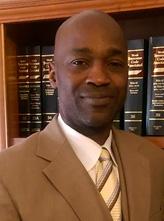
Adriane P. O’Neal is the office manager at the Law Office of Darrell J. O’Neal where she is responsible for hiring new employees and overseeing training. She holds a Bachelor’s Degree in Public School Music and a Master’s Degree in Curriculum and Instruction, and is a former educator and published author.

12 Id.
13 32 F.4th 82 (1st Cir. 2022).
14 Id.
15 Id.
16 Id.
17 Id.
18 Id.
19 https://www.fisherphillips.com/news-insights/covid19-workplacesafety-lawsuits.html

20 https:www.osha.gov (Google-COVID-19-Templace-OSHA)
21 https://cfabilene.org/uploads/Coronavirus-Workplace-PoliciesTEMPLATE.pdf
22 https://www.huschblackwell.com/newsandinsights/50-state-updateon-covid-19-business-liability-protections
18


Jennifer and Joel Hobson Hobson Realtors 901.761.1622 www.hobsonrealtors.com


20
Shelby County Circuit Court COURT REPORT:
by STEPHEN LEFFLER
covers jury trials from February 2022 through August 2022
DIV. 1: FELICIA CORBIN-JOHNSON
1. CT-0981-20, 2-28-22, Jordyn Johnson v. Genuine Parts Company d/b/a Napa Auto Parts: Auto Accident, Jury, Thomas R. Greer and Nora Taube for Plaintiff, Christopher Myatt and Joshua Baker for Defendant. Plaintiff Verdict: $300,000.00 (Trial on damages only).
2. CT-002895-18, 6-1-22, Demario Johnson v. Anitra Briggs: Auto Accident, Jury, W. David Cheek for Plaintiff, Lori D. Parish for Defendant. Plaintiff verdict: $9,696.67 (Medical Expenses – $6,446.67; Pain and Suffering - $3,250.00)
3. CT-002948-18, 8-15-22, David Page v. Joshua Conley: Auto Accident, Jury, Thomas R. Greer and Nora Taube for Plaintiff, Richard E. Sorin and Melanie M. Stewart for Defendant. Plaintiff Verdict: $1,750,000.00. (Economic Damages - $1,000,000.00; Non-Economic Damages - $1,000,000.00 reduced to $750,000.00 per statute)
DIV. 2: JAMES F. RUSSELL
No verdicts on contested cases this reporting period.
DIV. 3: VALERIE L. SMITH
1. CT-4049-21, 7-14-22, Milton Stephens and Susan Stephens v. Rebecca Biggs and Kathryn Biggs: Breach of Contract (Landlord/Tenant), Non-Jury, Kevin A. Snider and William R. Faulk for Plaintiff, A. Wilson Wages for Defendant. Plaintiff verdict for $16,085.00.
DIV. 4: GINA C. HIGGINS
1. CT-3864-20, 5-16-22, Carl Johnson v. Robert Havens: Auto Accident, Jury, Derek O. Fairchilds for Plaintiff, Robert L. Moore and Craig Flood for Defendant. Plaintiff verdict for $34,657.00. (Trial on damages only)
DIV. 5: RHYNETTE HURD
1. CT-0060-21, 7-22-22, Kari Ware, Individually and as Surviving Spouse of Sean Ware v. Jeremy Lewin and Chaistle Moss: Auto Accident, Jury, J. Joseph Leatherwood IV for Plaintiff, James B. (Trey) McLain III for Defendant-Lewin, Defendant-Moss Pro Se, Plaintiff verdict: $21,739.17 (Stipulated damages; Fault was 40% to Jeremy Lewin and 60% to Chaistle Moss)
DIV. 6: JERRY STOKES
1. CT-003809-18, 4-1-22, Ophelia Jones v. Samuel Ross: Auto Accident, Jury, James Bryan Moseley for Plaintiff, Lori D. Parish for Defendant. Plaintiff verdict: $1,140.00 (Medical Expenses – $840.00; Pain and Suffering - $300.00)

2. CT-3306-20, 6-6-22, Cherice Holliday v. Perry Garner: Breach of Contract (Landlord/Tenant), NonJury, Edd L. Peyton for Plaintiff, Samuel M. Fargotstein for Defendant. Plaintiff verdict: $4,863.66 and $4,818.50 attorney fee.
3. CT-0974-20, 6-8-22, Rice Amundsen and Caperton v. Judy Ross: Breach of Contract, Non-Jury, Nicholas J. Tansey for Plaintiff, Defendant Pro Se, Plaintiff verdict: $18,668.13.
21
4. CT-2930-19, 6-10-22, Allison Greg v. Christopher Dale Wheatley: Auto Accident, Jury, Lewis W. Lyons for Plaintiff, Robert L. Moore for Defendant. Plaintiff verdict: $18,000.00 (Medical Expenses - $8,000.00; Lost Wages - $1,000.00; Pain and Suffering - $4,500.00; Loss of the Ability to Enjoy Life - $4,500.00).
5. CT-5002-20, 8-2-22, Memphis City Cartage, LLC v. United Cargo International: Breach of Contract, Non-Jury, Andrew F. Marquis and Carl Wyatt for Plaintiff, Kevin Bernstein for Defendant, Plaintiff verdict: $73,039.46 (Compensatory - $50,363.83; Attorney Fee$13,700.82; Pre-Judgment Interest - $8,974.81).
6. CT-2341-19, 8-18-22, Stephanie D. Bailey and Brice A. Bailey v. Tressa L. Ogles and William M. Ogles: Defamation, Jury, Bruce S. Kramer, Jacob Webster Brown and Gary K. Smith for Plaintiffs, Ross Webster and Robert C. Hale for Defendants, Plaintiff verdict: $200,000.00 for each plaintiff. In post-trial motions, Defendants renewed their motion for directed verdict against Brice Bailey and the motion was granted and the claims of Brice Bailey were dismissed with prejudice. In another post trial motion, Tressa Ogles sought a new trial or remittitur. That motion was granted and a new trial was ordered. The judge denied the remittitur because he would have remitted the damage award to such a degree that it would destroy the verdict.
DIV. 7: MARY L. WAGNER
1. CT-0679-22, 4-29-22, Kensington Manor
DIV. 8: ROBERT S. WEISS
1. CT-4710-19, 5-10-22, Bianca Hall v. Shelby County Board of Education d/b/a Shelby County Schools: Auto Accident, Non-Jury, Jeffrey S. Rosenblum and Matthew T. May for Plaintiff, Kavita G. Shelat, Andre B. Mathis and Kenneth M. Walker II for Defendant. Plaintiff Verdict: Total Damages - $237,479.01 ($87,479.01 Economic Damages and $150,000.00 NonEconomic Damages) Less 10% comparative fault to Plaintiff for a net judgment of $213,731.10.
2. CT-1105-20, 5-18-22, Demeta Polk v. Shelby County Board of Education: Auto Accident, NonJury, Kenneth O. Cooper for Plaintiff, Kavita G. Shelat for Defendant. Plaintiff Verdict: $16,605.88 (Economic Damages - $8,105.88; Pain and Suffering - $4,000.00; Loss of Enjoyment of Life - $4,000.00; Past Loss of Earning Capacity - $500.00).
3. CT-0978-20, 8-19-22, Southern Roofing and Renovations, LLC v. Gregory Stotts: Breach of Contract, Non-Jury, Malcolm B. Futhey III for Plaintiff, Michael Don Harrell for Defendant. Plaintiff Verdict for $26,133.33 (Compensatory damages - $19,600.00, Attorney fee - $6,533.33).
DIV. 9: YOLANDA R. KIGHT
1. CT-1513-20, 7-29-22, Undra Hayes v. John Heckman: Auto Accident, Jury, Geoffrey Lewter for Plaintiff, Nicholas Owens for Defendant. Plaintiff Verdict: $911.40 (Medical Expenses - $911.40) Verdict reduced by 49% comparative fault; Net Plaintiff Verdict $464.81


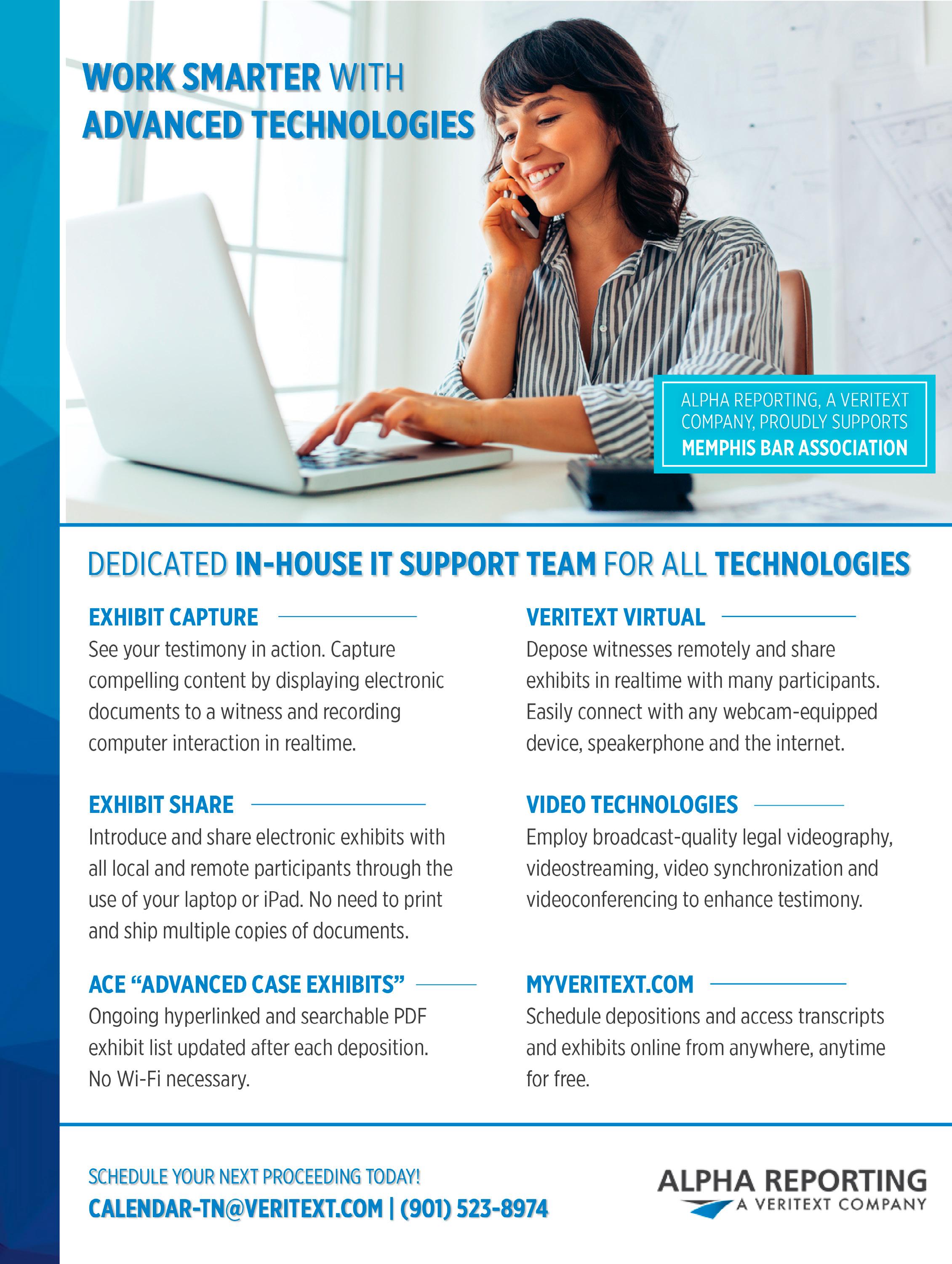
23
United States District Court
WESTERN DISTRICT OF TENNESSEE—WESTERN DIVISION
by AUDREY CALKINS
Covers jury trials from July 2022-December 2022
DISTRICT JUDGE JOHN T. FOWLKES, JR.
1. USA v. Rodercus Freeman: No. 20-20164
Trial from August 1, 2022 through August 5, 2022
Attorneys for Prosecution: Tony Arvin and Scott Smith

Attorney for Defendant: Blake Ballin
Charges in Indictment: 2 counts of credit union and bank robbery and 1 count of attempted robbery of a credit union.
Verdict: Guilty as to bank robbery and attempted credit union robbery; not guilty as to credit union robbery.
DISTRICT JUDGE SHERYL H. LIPMAN
1. USA v. David Moore: No. 21-20219
Trial from July 11, 2022 through July 13, 2022
Attorneys for Prosecution: Regina Thompson and Marque Young
Attorneys for Defendant: Robert Thomas and Ned Germany
Charges in Indictment: 1 count of being a felon in possession of ammunition.
Verdict: Not guilty.
SENIOR DISTRICT JUDGE SAMUEL H. MAYS
1. USA v. Travis Lester:, No. 21-20152
Trial from August 8, 2022 through August 11, 2022
Attorney for Prosecution: Raney Irwin
Attorney for Defendant: David Bell
Charges in Indictment: 1 count of being a felon in possession of a firearm.
Verdict: Guilty.
SENIOR DISTRICT JUDGE JON P. MCCALLA
1. Kim King and Darren King v. William Chase, Jr.: No. 22-2030
Trial from July 11, 2022 through July 12, 2022
Attorney for Plaintiff: Drayton D. Berkeley
Attorney for Defendant: William Christopher Frulla
Complaint for negligence related to a car wreck.
Verdict: Defense verdict.
DISTRICT JUDGE MARK S. NORRIS
1. USA v. Jeffery Sevier, Jacquez Reverand, and Cortney McIntyre: No. 19-20205
Trial from July 11, 2022 through July 25, 2022
Attorneys for Prosecution: Greg Allen and Michelle Kimbril-Parks
Attorneys for Defendants: James Jones, Ruchee Patel, and Andre Mathis
Charges in Indictment:
Count 1: conspiracy to possess over 1 kilogram of a heroin mixture with intent to distribute (against Sevier, Reverand, and McIntyre)
Count 2: conspiracy to possess over 5 kilograms of a mixture containing cocaine with intent to distribute (against Sevier, Reverand, and McIntyre)
Counts 3 and 5: conspiracy to use or carry a firearm during and in relation to a drug trafficking crime (against Sevier, Reverand, and McIntyre)
Counts 4 and 6: conspiracy to possess a firearm in furtherance of a drug trafficking crime (against Sevier, Reverand, and McIntyre)
24
Counts 7 and 8: brandishing, discharging, carrying, and using a firearm during and in relation to a drug trafficking crime (against Sevier and Reverand)
Count 9: attempting to corruptly persuade a potential witness not to speak with law enforcement with the intent to hinder a federal investigation (against Sevier)
Count 10: possession of heroin with intent to distribute (against McIntyre)
Count 11: possession of 100 grams or more of heroin with intent to distribute (against McIntyre)
Count 12: possession of two firearms in furtherance of a drug trafficking crime (against McIntyre)
Verdict: Guilty as to Jeffery Sevier on Count 2; Guilty as to Jacquez Reverand on Counts 2, 5, 8; Guilty as to Courtney McIntyre on Counts 1, 10, 11. Not guilty as to Jeffery Sevier on Counts 1, 5, 7, 8, 9. Not guilty as to Jacquez Reverand on Counts 1. Not guilty as to Cortney McIntyre on Counts 2, 5, 7, and 12. Not guilty as to all Defendants on Counts 3, 4, 6.
DISTRICT JUDGE THOMAS L. PARKER
1. Ariane D. Grant v. Blues City Brewery, LLC: Trial from August 22, 2022 through August 24, 2022
Attorneys for Plaintiff: Ralph T. Gibson, Alexandria Holloway, and Emily Johns
Attorneys for Defendant: Louis P. Britt, III and Mollie Katherine Wildmann

Complaint for sex discrimination and retaliation.
Verdict: Jury verdict for Plaintiff on sex discrimination claims. Summary judgment for defendant on retaliation claims.
Judgment: $240,000.00 including $14,478.80 in backpay, $25,521.20 in compensatory damages, and $200,000 in punitive damages.
2. Kenneth W. Parnell v. Johnny Yolanda Fitz, Matthew Cochran, and F/N/U Baucom, Correctional Employee at WTSP: No. 17-2847
Jury trial on liability from October 24, 2022 through October 28, 2022; bench trial on damages on October 31, 2022
Attorneys for Plaintiff (at trial only): Jacob Brown
Attorneys for Defendants: Dean Seif Atyia, Demetrius Alan Daniels-Hill, Frank LoGrippo
Complaint for violation of the Plaintiff’s First Amendment rights related to his efforts to file a grievance.
Verdict: Jury verdict for Plaintiff on liability as to Fitz. Defense verdict as to Cochran and Baucom.
Damages: Judge Parker awarded $1,776.00 in compensatory damages.
CHIEF DISTRICT JUDGE S. THOMAS ANDERSON
1. USA v. Preston Antwan McNeal: No. 19-10007
Trial from August 1, 2022 through August 4, 2022
Attorneys for Prosecution: Adam Davis and Josh Morrow
Attorney for Defendant: Greg Gookin
Charges in Indictment: 1 count of conspiracy to possess with intent to distribute more than 50 grams of actual methamphetamine (ICE), 3 counts of possession with intent to distribute methamphetamine, 1 count of possession with intent to distribute more than 5 grams of actual methamphetamine (ICE), 1 count of possession with intent to distribute cocaine, and 1 count of possession with intent to distribute more than 50 grams of actual methamphetamine (ICE).
Verdict: Guilty on 1 count of conspiracy to possess with intent to distribute more than 50 grams of actual methamphetamine (ICE); 1 count of possession with intent to distribute more than 5 grams of actual methamphetamine (ICE); 1 count of possession with intent to distribute cocaine; and 1 count of possession with intent to distribute more than 50 grams of actual methamphetamine (ICE). Not guilty on 3 counts of possession with intent to distribute methamphetamine.
DISTRICT JUDGE J. DANIEL BREEN
1. USA and DeAnna Yarbrough v. Chad Ables d/b/a
Pops Cove: No. 18-1249
Trial from December 6, 2022 through December 9, 2022
Attorneys for Plaintiff: Vic Ivy, Beth Frank, Katherine Raimondo, Oneshia Sheiska Herring, Abigail Nurse
Attorney for Intervenor Plaintiff: Vanessa Bullock and James David DiMarco
Attorney for Defendant: James Noble Grant, III Complaint for violation of the Fair Housing Act for alleged sexual harassment and disparate treatment of female tenants.
Verdict: Jury verdict for Plaintiff.
Judgment: $7,500.00 in compensatory damages and $10,000.00 in punitive damages to Bethany Baggett; $5,000.00 in compensatory damages and $10,000.00 in punitive damages to Cassandra Patterson; $3,000.00 in compensatory damages and $10,000.00 in punitive damages to Stephanie S.; $2,500.00 in compensatory damages and $10,000.00 in punitive damages to Shelia Teague; $500.00 in compensatory damages and $500.00 in punitive damages to Mahkia Serrano; $1,500.00 in compensatory damages and $10,000.00 in punitive damages to Deanna Yarbrough.
25
CLC Corner:
BIG THINGS HAPPENING AT THE CLC
By KERRY KRAUCH, LEAD CIVIL STAFF ATTORNEY, IJP
The pandemic was a difficult time for everyone. One of the unfortunate results was the Community Legal Center had limited opportunities to meet with people out in the community. Now that it is safer for us to go out, we are thrilled to announce two new opportunities allowing us to meet the public and expand our services to meet the needs of the community. The United Way of the MidSouth and the Women’s Foundation for a Greater Memphis have graciously given us the funds to embark on two new initiatives: civil and immigration legal consultations for the families of Su Casa and estate planning advice and assistance in the 38103 and 38126 area codes.

Su Casa Partnership
Su Casa Family Ministries is a social services organization that works primarily with Latino immigrant community. They have been a partner with the CLC for many years as we both seek to assist the same population. We approached United Way of the Mid-South for a grant to bring legal services directly to their families at Su Casa. There are many people in the immigrant population that do not know their legal rights. The year-long grant will allow CLC attorneys to give presentations on legal topics, and to meet with the families individually. CLC attorneys and Department of Justice legal representatives will periodically be stationed at Su Casa to offer brief advice and represent individuals who have immigration and civil law issues.
Women’s Foundation of Greater Memphis Partnership
The Women’s Foundation of Greater Memphis has embarked on a new initiative called “Vision 2025”, which aims at increasing investment and reducing poverty in

five Memphis neighborhoods by 2025. The first two zip codes that are targeted are 38126 and 38106. Estate planning (such as wills and power of attorney) is an

26
important and valuable tool in creating financial stability for Memphis families. As part of this project, the Women’s Foundation has funded the CLC to present estate planning educational seminars to the residents in those zip codes. Many people think that because they do not have significant assets they do not need a will. However, a will helps smooth the transition of real estate after death, making the grieving process less stressful for the family. CLC staff attorneys will go to public locations in those present information regarding wills, powers of attorney, advance directives, and other estate planning topics. After the presentation, the attorneys will meet with attendees who wish to execute estate planning documents.

Through the generous funding of the United Way of the Mid-South and the Women’s Foundation of Greater Memphis, the CLC will be back in the community educating and advising the citizens of Shelby County. Community partnerships help further the goal of educating and empowering the public. If you know of a group or organization in the 38126 or 38106 zip codes

that would like to host the CLC for estate planning education, please call 901-543-3395, ext. 209 or email kerryk@clcmemphis.org. You can also support our work by making a donation at https://clcmemphis.org/waysto-give/.
Kerry Krauch has been with the Community Legal Center since 2009, first as a volunteer and then as a staff attorney. A proud, lifelong Memphian, she received both her undergraduate degree and J.D. from The University of Memphis. In law school, Ms. Krauch clerked at Shelby County Probate Court for Judge Karen Webster. As an attorney, she has practiced in the areas of immigration, elder law, and general civil law. Ms. Krauch has a passion for representing disenfranchised and underserved clients.

27
MALS Corner: Addressing the Justice Gap
By CINDY COLE ETTINGOFF, CEO and General Counsel, Memphis Area Legal Services, Inc.


Each year the number of individuals who need help from MALS increases and MALS strives to serve as many in our community as we can. However, serving an increasing need is a herculean task when congressional appropriations to one of our primary funders, Legal Services Corporation, have seen only slight a slight percentage increase in the last fifteen years – certainly not remotely in keeping with the increase in need. The recently released Justice Gap Report 2022, provides some startling and daunting statistics on the justice funding gap. Among the most alarming are the following: low-income Americans did not receive any or enough legal assistance for 92% of their civil legal problems; 74% of low-income households experienced one or more civil legal problems in the last years; and 39% of low-income households experienced 5 or more civil legal problems in the last year. Among the most common types of problems are consumer issues (scams), health care, housing, income maintenance and matters related to education. Over one-half (55%) of lowincome Americans who experienced a civil legal problem say those problems substantially impacted their lives with the consequences affecting their finances, mental health, physical health, safety, and relationships. Among those who did not seek legal assistance, 46% cited the cost of legal help as an important barrier to seeking and receiving legal help.
The numbers in the Justice Gap report reflect the situation of the country as a whole. However, for Memphis, as the second poorest large metropolitan area in the United States and 5th highest in the nation in rates of domestic violence, I fear the situation is even worse than that for the nation as a whole. Our community has tremendous civil legal needs associated with poverty, debt, and domestic abuse. As children have returned to school, their needs, and the deleterious effects of homelessness on their school attendance is in the forefront of our minds.

As 5th in the nation in rate of domestic violence, the needs of victims for orders of protection for themselves and their children, for shelter, for divorces and child support, and for the return of bank accounts contents or vehicles commandeered by their abusers, is tremendous. MALS is constantly seeking new means and sources of funding to provide assistance, not only for children and families, but also for the elderly who fall victims to scams, abuse and neglect, and domestic violence.
The numbers of those in need, the effect of lack of service, and the need to increase the number of those to whom we are able to serve is the reason that while seeking additional funding MALS also continually seeks to be exceptional stewards of the dollars given us. Those who were attended the ribbon cutting at MALS new offices, saw that MALS’ new offices are less than half the size of MALS’ former space. Dollars that could have gone toward office space are instead being put toward attorneys, paralegals, administrative staff, and technology to enable MALS to serve more of our community. As lawyers, we have seen what happens to unrepresented individuals, statistics from a variety of sources indicate that for those who go to court without legal representation, in over 90% of the cases, a judgment is entered against the unrepresented.
Cindy Cole Ettingoff is the CEO and General Counsel for Memphis Area Legal Services, Inc. A long time legal services volunteer and supporter, Cindy joined MALS after thirty years of practicing law. In private practice, Ms. Ettingoff represented employers, employees, and unions in litigation, contract negotiations, arbitrations, and mediations.
28
Most of us can remember when we first entered a courtroom. However, as lawyers, we had legal knowledge and possibly a mentor. In addition, unlike our clients, we were not afraid of losing our dwellings or facing threats affecting personal safety. Many of MALS’ clients arrive at the courthouse having never been there before. They are frighted and intimidated. They do not know where to go, where to sit, when they can speak, or what they can say. Often their fears overtake them, and they flee before their case is even called.
Representation or advice through MALS and MALS’ pro bono volunteers can be not just life changing, but in some instances lifesaving. For that reason, MALS has taken every opportunity to expand our reach through partnerships. MALS was proud to be a part of the ERA/ MSERA program that sought to prevent evictions via federally funded rental assistance dollars. Although that program has ended, MALS’ work on behalf of tenants existed prior to the program and has never cased. As it has done since 1997, the Memphis Fair Housing Center (MFHC), continues to address housing issues and engage in housing counseling for our community. With over 95 years of combined housing law experience, MALS has independently provided representation to over 6275 tenants and mortgagees in the last five-year period. In an effort to reach more of the those in need and in addition to the Second Saturday Legal Clinics, and the Thursday afternoon Courthouse Advice and Counsel Clinics, MALS also offers Rights and Responsibilities Clinics for renters and mortgage holders’ clinic. Those clinics are held every other month, from 5:30 – 7:30, on the third Tuesday at the Benjamin Hooks Library. As a recognized legal authority on housing matters in Memphis, Lauderdale, Fayette and Tipton counties, MALS’ Fair Housing Center, is part of a statewide network of right to counsel programs. We have developed and maintain rapport with the community, judges, and landlords’ attorneys. In fact, I was recently stopped in a restaurant by a General Sessions Judge who shared news of the invaluable service she sees MALS attorneys providing in her courtroom.

The benefit MALS offers in the housing arena, as shared by the judge, is seen in all of MALS’ service areas. We have seen firsthand the difference timely legal services can make in the lives of our clients. The justice gap, the needs of our community and the positive effects

civil legal representation can make is the reason MALS Campaign for Equal Justice is so critical. Campaign for Equal Justice (CEJ) dollars help fill our funding gap to enable us to address the justice gap. CEJ dollars are used to provide civil legal services, primarily in areas of urgent need as those needs arise, often long before other grant dollars can be sought or become available. This year MALS is honored to have long time access to justice supporter, Sharon Ryan, head MALS’ Campaign for Equal Justice. As a tireless supporter of equal access to justice, Sharon has provided thoughtful assistance for legal aid organizations to enable them to meet more of the needs of its service areas. When she or a member of her CEJ team contact you, please give generously.
The Campaign for Equal Justice will, for the first time since the pandemic, kick off with the October 15, Justice for All Ball. The Justice for All Ball is more than a fundraiser to enable MALS to better serve the community, it is an opportunity to focus on, celebrate, and build on the good in Memphis. Practice your dance moves and join MALS and our incredible emcee, Beverly Robertson, to celebrate those we serve, the work we do, and the good our communities have to offer, while enjoying performances by the Beale Street Flippers, the Staxx Performers, DJ Cleveland “the Voice” Bradfield, and the PC band and enjoying delicious food from Memphis’ own Chef Phillip Dewayne.
29
Annual Meeting 2022
Passing the Gavel
2022 President Tannera Gibson passed the gavel to 2023 President Jennifer Sink during the Annual Meeting held on December 8, 2022 at the Memphis Botanic Garden.

Amber
Floyd
Received the Sam
A. Myar Jr. Award and the W.J. Michael Cody Access to Justice Award


Congratulations to Amber Floyd, General Counsel for the Memphis- Shelby County Airport Authority, who was presented with the Sam A. Myar, Jr. Award by the MBA. Named for the late Sam Myar, who died in 1959 at the age of 39, the Myar Award is given each year to an attorney younger than 40 years old who has rendered outstanding personal service to the Memphis and Shelby County legal profession and community. Amber also received the W. J. Michael Cody Access to Justice Award from Memphis Area Legal Services (MALS) in recognition of her outstanding service and leadership to MALS and its clients.






Terrence Reed Presented with the Judge Jerome Turner Lawyers' Lawyer Award
Congratulations to Terrence Reed, managing director of employment litigation at Federal Express Corporation, who was presented with the most prestigious award bestowed upon a Memphis attorney, the Judge Jerome Turner Lawyer’s Lawyer Award. This honor is awarded annually to a member of the Memphis Bar Association (MBA) who has practiced for more than 15 years and who exemplifies the qualities in the Guidelines for Professional Courtesy and Conduct.
30
2023 MBA Officers (left to right)
Adam Johnson, Vice-President; Jennifer Sink, President; Tannera Gibson, Past President; Lauran Stimac; Secretary/Treasurer
See more photos from the Annual Meeting! Click Here
Watch Amber’s Sam Myar acceptance video
Watch Terrance’s acceptance video
Moving FORward requires VISion
Introducing
forward vision
FORVIS is a forward-thinking professional services firm committed to Unmatched Client Experiences TM
We anticipate our client’s needs and outcomes, preparing them for what’s next by offering innovative solutions.
Created by the merger of BKD and DHG—a merger of equals—FORVIS has the enhanced capabilities of an expanded national platform and deepened industry intelligence. With greater resources and robust advisory services, FORVIS is prepared to help you better navigate the current and future dynamic organizational landscape.
ASSURANCE / TAX / ADVISORY
forvis.com
FORVIS,
from the
We are FORVIS. Forward vision drives our Unmatched Client Experiences. FORVIS is a trademark of FORVIS, LLP, registration of which is pending with the U.S. Patent and Trademark Office.
merger of BKD and DHG
Bar Scene Meeting New Judges


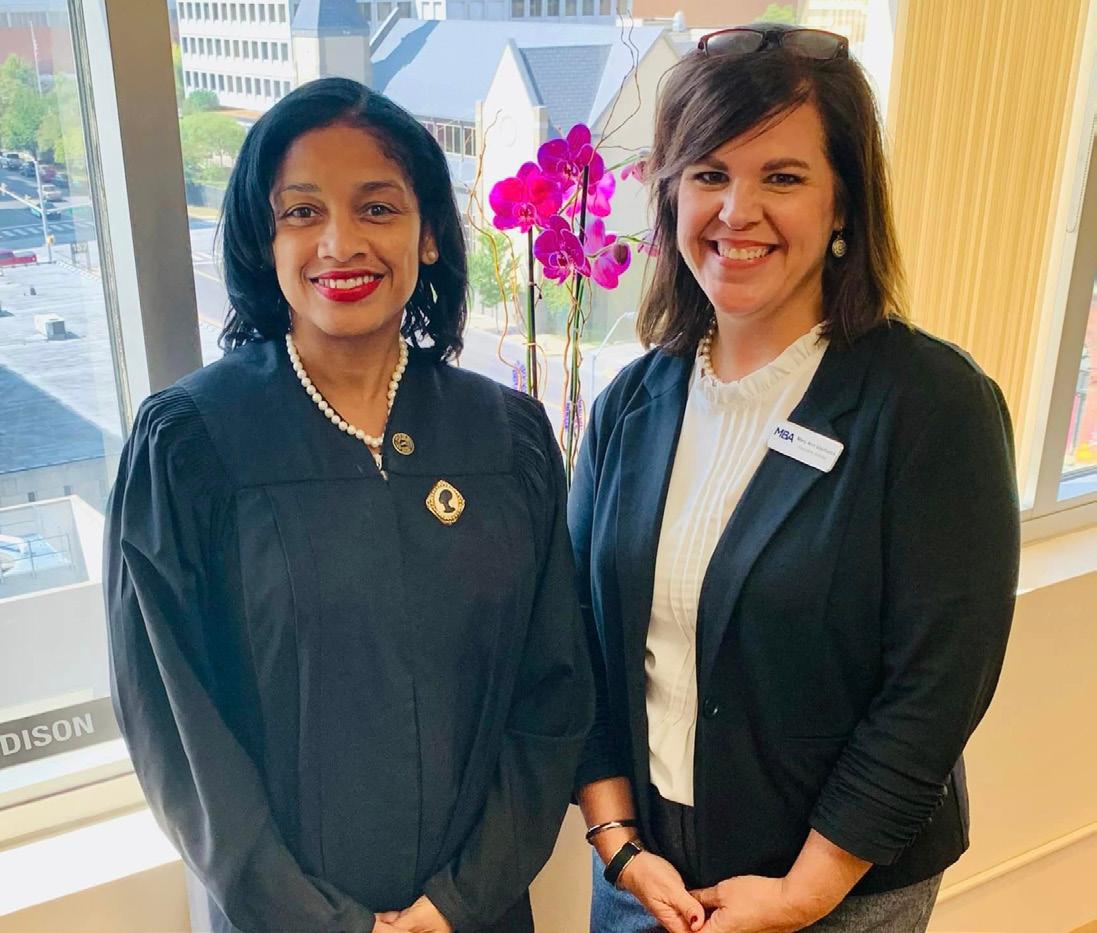



32









33
2022
Bar Scene Beach Bar Conference











34 Bar Scene
2022
Beach Bar Conference






35
1L
Bar Scene
2022 Orientation





36
Bar Scene Around Town
MALS Ribbon Cutting of New Office
Congratulations to MBA Board Member, University of Memphis Law Professor, community leader, and now District Attorney Steve Mulroy on his inauguration.
Renaming Ceremony of Odell Horton Federal Building
YLD WREG Legal Lines (Free Advice Clinic)
JODI BLACK
Jodi Black has joined Bailey & Greer, PLLC as an associate. Black attended the University of Manitoba and graduated with her Bachelor of Nursing degree in 1992. With extensive experience working in the surgical Intensive Care Unit, the cardiovascular Intensive Care Unit, the heart catheterization lab, and in Labor and Delivery, medicine has always been the backbone of Black’s practice. After graduating from The University of Memphis, Cecil C. Humphreys School of Law in 2004, she initially worked for a medical malpractice firm defending physicians and insurance companies who had been sued for medical malpractice. Black then switched sides and has only represented injured people since 2006. She has tried cases in General Sessions, Circuit Court, and Federal Court.
JUDGE BERNICE B. DONALD






Judge Bernice B. Donald of the United States Court of Appeals for the Sixth Circuit, became the first judge competitively selected to receive the Sandra Day O’Connor Award, which is the highest honor of The National Judicial College. Judge Donald received this award on November 10, 2022 during the Appellate Judges Education Institute’s (AJEI) Annual Summit. Judge Donald, 70, who last year announced she was moving to senior status, became the first African American woman to serve on the Sixth Circuit when she was confirmed by the Senate on September 6, 2011 following her nomination by President Barack Obama on December 1, 2010.
SCOTT DOUGLASS
Scott Douglass has joined Baker Donelson as an IP Shareholder. Douglass concentrates his practice in the areas of trademarks, copyrights, and data privacy, and litigates trademark, trade dress, and copyright claims in federal courts. He also helps clients maximize the value of their intellectual property through licensing, and advises clients on the adoption, protection, and registration of brands and product launches. Douglass is a member of the Memphis Bar Association, the Licensing Executives Society, American Intellectual Property Law Association, Copyright Society of the South, and International Trademark Association.

FREEMAN B. FOSTER
Freeman B. Foster, who previously served as a senior assistant city attorney for the City of Memphis, has joined Baker Donelson as of counsel in the firm’sMemphis office and a member of the Health Care Litigation Group. A graduate of The University of Memphis Cecil C. Humphreys School of Law, Foster is a member of the Memphis and Tennessee Bar Associations and the Ben F. Jones Chapter of the National Bar Association.


NICOLE M. GRIDA
Nicole M. Grida has joined Bowman and Brooke LLP, a nationally recognized trial firm with one of the largest product liability practices in the country, as a Partner. In her new role, she will help the firm establish a presence in Tennessee and expand its footprint by defending corporate clients in complex product liability and general civil litigation. Nicole was also elected International Justice of the Phi Alpha Delta Law Fraternity, International, the nation's largest legal fraternity, on August 5, 2022, and was sworn into this prestigious role at the Awards Banquet following the conclusion of the Fraternity’s 64th Biennial Convention & Leadership Conference.






JUDGE ANDRE B. MATHIS

Judge Andre B. Mathis was confirmed a seat on the United States Court of Appeals for the Sixth Circuit on September 8, 2022. At the time of his nomination by President Joseph Biden on November 17, 2021, Judge Mathis was a Partner at Butler Snow, LLP in Memphis where he focused his practice on commercial litigation, labor and employment law, education law, white-collar criminal defense and general civil litigation. Before joining Butler Snow, he practiced at Glankler Brown PLLC for over a dozen years. Judge Mathis was a member of the Western District of Tennessee’s Criminal Justice Act Panel and worked on pro-bono cases for the Tennessee Innocence Project. Prior to his confirmation hearing, Mathis received a “Well Qualified” rating from the American Bar Association.

37
MATT WHITE
Matt White, a Shareholder at Baker Donelson, has earned the Certified Information Privacy Technologist (CIPT) credential from the International Association of Privacy Professionals (IAPP) White is also the co-chair of the Firm's Financial Services Cybersecurity and Data Privacy Team. A Certified Information Privacy Professional (CIPP/US, CIPP/E) and Certified Information Privacy Manager (CIPM), he counsels clients on all aspects of privacy and cybersecurity, including litigation and breach response, privacy compliance, transactional diligence, and the defense of regulatory actions. He also holds the Payment Card Industry Professional (PCIP) certification from the PCI Security Standards.
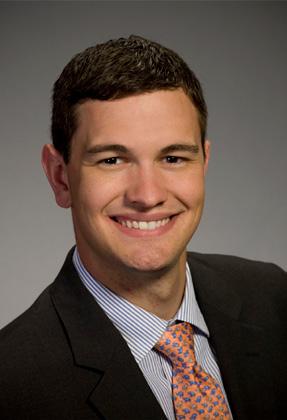
Correction: In a previous issue of Memphis Lawyer, Frank Childress was incorrectly named a recent shareholder at Baker Donelson, a position he has held since joining the firm several years ago. The intention was to recognize him for being elected to a second two-year term on the American College of Bankruptcy Foundation's board of directors. We apologize for this error, and congratulate Frank on his election.


SUBMIT YOUR NEWS AND UPDATES
If you are an MBA member in good standing and you’ve moved, been promoted, hired an associate, taken on a partner, or received an award, we’d like to hear from you. We will not print notices of honors determined by other publications (e.g., Super Lawyers, Best Lawyers). Notices are limited to 100 words; they are printed at no cost to members and are subject to editing. E-mail your notice and hi-resolution photo (300 dpi) to kswan@memphisbar.org.

38



 BY LYNDA WRAY BLACK
BY LYNDA WRAY BLACK
























































































